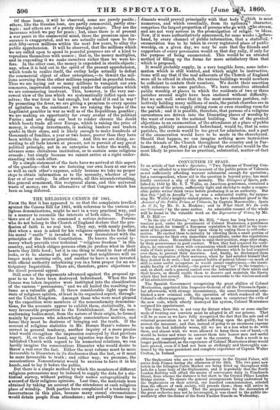THE RELIGIOUS CENSUS OF 1861.
F3102/ the first it has appeared to us that the complaints levelled against the Census Bill far 1861, with reference to the various re- ligious denominations, might be met in a very practical way, and in a manner to reconcile the interests of both sides. The objec- tions are of a nature to command a serious deference. Persons who do not belong to the Church of England declare that the pro- fession of faith is no real test. They say, with manly justice, that when a man is asked for his religions opinions he feels that his moral " castle " is invaded in a way inconsistent with the principles of the British Constitution. He knows the social ty- ranny which prevails over technical "religious freedom" in this country, and which obliges persons often to profess what in their hearts they little heed; but it is one thing to stand in fear of cold looks, or to be alarmed at the prospect that neighbours will no longer make morning calls, and another to have a man invested with official authority catechizing you in a form proper for an an- ticipatory Inquisition. There are, therefore, grave objections to the direct personal appeal.
Still some of the arguments advanced against the proposal ap- pear to us to have been destroyed beforehand. When the last Census was taken inquiries were instituted into the classification of the various "persuasions," and we all hailed the resulting vo- lume as a valuable gift. It threw considerable light upon the state of religious opinion, at least in its organized aspect, through- out the United Kingdom. Amongst those who were most pleased by the exposition were members of the nonconformity denomina- tions for the accounts appear to exhibit them, statistically, in a very/favourable proportion to the Establishment. Now the non- conforming bodies must, from the nature of their origin, be formed mainly by persons who acknowledge conscientious motives and hence they must be desirous of bringing out the truth. if the account of religious statistics in Mr. Horace Mann's volume be correct in general tendency, another inquiry of a more precise kind would strengthen the impression conveyed by that previous report. If, on the other hand, any injustice was done to the Es- tablished Church with regard to its numerical relations, we can hardly imagine the conscientious Dissenter who would desire to throw a veil over the fact. Either the next volume must be more favourable to Dissenters in its disclosures than the last, or it must be more favourable to truth ; and either way, we presume, the conscientious Nonconformist would be anxious to have it in his hands, and to lay it before the public.
But there is a simple method by which the members of different religious persuasions may be induced to supply the data for a sta- tistical survey, without putting their names autographically to *record of their religions opinions. Last time, the materials were obtained by taking an account of the attendance at each religious place of worship. Both parties have complained of a tendency to incorrectness in this plan, because many casual circumstances would detain people from attendance ; and probably those impe- diments would prevail principally with that body 'hich is MOS numerous, and which essentially, from its nationa I character,
comprises the largest proportion of persons who go with eZhe stream, and are not very serious in the promulgation of religio. ideas. Now, if it were authoritatively announced, for some weeks i,kefore-
hand, by every channel of publio information, that a statisfid.-1 enumeration was to be taken in every registered place of public, worship, on a given day, we may be sure that the friends and supporters of every persuasion would on that day rally, if only for the purpose of being enumerated. This would be an attested method of filling up the forms far more satisfactory than that which is proposed. It would probably supply, in a very tangible form, some infor- mation which is still wanted, and which might be instructive. Some will say that if the real adherents of the Chdrch of England were all to attend in church, the various buildings would nowhere be sufficient to contain their numbers. We doubt their assertion with reference to some parishes. We have ourselves attended.- public worship at places in which the residents of two or three parishes around might have been enclosed without difficulty. But we are well aware that in the most numerous parishes, col- lectively holding many millions of souls, the parish churches are in no way sufficient to supply, sitting room or even standing room for the parish; and it is possible, therefore, that persons of a religious earnestness are driven into the Dissenting places of worship by the want of room in the national building. One of the greatest objections to an enumeration of the attendance at a place of public worship, publicly announced beforehand, would be, that in some parishes, the crowds would be too great for admission, and a part of the enumeration would have to be made in the churchyard. Should that happen, we can imagine nothing more instructive to the friends of the Church throughout the country and in Par- liament. Anyhow, that plan of taking the statistics would be the most likely to procure for us practical, substantial, matter-of-fact data.


























 Previous page
Previous page